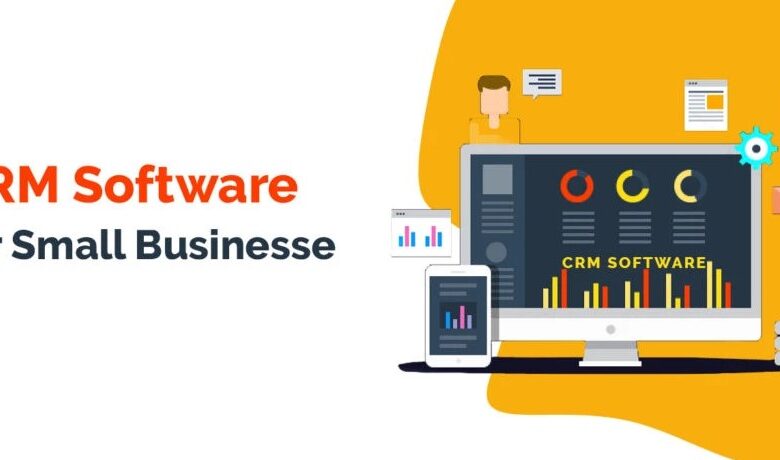Benefits of CRM Software for Small Business Owners

In the dynamic landscape of modern business, staying ahead requires strategic planning and efficient management of customer relationships. For small business owners, Customer Relationship Management (CRM) software emerges as a game-changer, offering a myriad of benefits that can significantly impact growth and sustainability. In this article, we will explore the profound advantages of CRM software for small businesses, shedding light on how this technology can revolutionize operations, enhance customer satisfaction, and boost overall productivity.
Understanding CRM Software for Small Businesses
At its essence, CRM software is a comprehensive tool designed to manage and nurture customer relationships. It serves as a centralized hub for customer data, interactions, and communication, empowering businesses to provide personalized experiences.
CRM software comes in various forms, with solutions specifically tailored for small businesses. These platforms offer scalability, ensuring that as the business grows, the CRM system can seamlessly adapt to evolving needs.
Key Benefits of CRM Software for Small Business Owners
Streamlining Communication and Collaboration:
Effective communication is the cornerstone of any successful business, and CRM software acts as a catalyst in this aspect. It consolidates all customer-related information in a centralized database, ensuring that every team member has access to the latest and most accurate data. This facilitates seamless communication and collaboration among different departments, fostering a cohesive work environment that is vital for small businesses aiming to maximize efficiency.
Enhanced Customer Data Management:
One of the primary functions of CRM software is to collect, organize, and manage customer data. Small businesses often struggle with scattered information across various platforms, making it challenging to gain a comprehensive understanding of their customers. CRM software consolidates this data, providing a holistic view of customer interactions, preferences, and purchasing behavior. Armed with this knowledge, small business owners can tailor their products and services to meet the specific needs of their clientele.
Improved Customer Engagement and Retention:
CRM software empowers small businesses to build stronger relationships with their customers. By tracking customer interactions and purchase history, businesses can personalize their communication and marketing strategies. Automated reminders and follow-up features enable timely responses to customer inquiries, enhancing overall customer satisfaction. Satisfied customers are more likely to become repeat customers, contributing to increased customer retention and loyalty.
Efficient Sales Process:
For small businesses, closing deals efficiently is crucial for sustained growth. CRM software streamlines the sales process by automating routine tasks, such as data entry and follow-ups. This allows sales teams to focus on high-value activities, such as building relationships and identifying new opportunities. With real-time insights into sales pipelines and performance metrics, small business owners can make informed decisions to optimize their sales strategies.
Data Security and Compliance:
Small businesses often grapple with the challenge of securing sensitive customer information. CRM software provides a secure platform for storing and managing customer data, reducing the risk of data breaches. Additionally, reputable CRM solutions adhere to data protection regulations and industry standards, ensuring that businesses remain compliant with legal requirements. This not only safeguards the business from potential legal repercussions but also builds trust with customers who are increasingly concerned about the security of their data.
Time and Resource Efficiency:
Small business owners wear multiple hats, juggling various responsibilities on a daily basis. CRM software automates repetitive tasks, such as data entry, email communications, and appointment scheduling, freeing up valuable time for business owners and their teams. This increased efficiency allows them to focus on strategic decision-making and core business activities, ultimately contributing to improved productivity.
Data-Driven Decision Making:
Informed decision-making is vital for the success of any business. CRM software provides valuable insights through analytics and reporting tools. Small business owners can analyze customer behavior, identify trends, and assess the performance of marketing campaigns. These data-driven insights empower business owners to make informed decisions that align with customer needs and market trends, giving them a competitive edge in their respective industries.
Scalability and Adaptability:
As small businesses grow, their needs evolve. CRM software is designed to scale alongside the business, adapting to changing requirements. Whether it’s an increase in the customer base, expanding product lines, or entering new markets, CRM solutions can accommodate these changes seamlessly. This scalability ensures that small businesses can continue to leverage the benefits of CRM software as they progress and expand.
Cost-Efficiency:
Contrary to the misconception that advanced technology comes with a hefty price tag, CRM software offers a cost-effective solution for small businesses. Many CRM providers offer scalable pricing plans, allowing businesses to choose features that align with their specific needs and budget constraints. The long-term benefits of improved efficiency, increased sales, and enhanced customer relationships far outweigh the initial investment, making CRM software a wise financial decision for small business owners.
Competitive Advantage:
In a competitive business landscape, gaining a competitive advantage is crucial for survival. CRM software provides small businesses with tools and insights that can help them stay ahead of the curve. By delivering personalized experiences, responding promptly to customer needs, and adapting to market trends, small businesses using CRM software position themselves as forward-thinking and customer-centric, distinguishing themselves from competitors.
FAQs About CRM Software for Small Business Owners
Q1: Is CRM software suitable for businesses of all sizes?
A1: Yes, while there are specific solutions for small businesses, CRM software is designed to cater to businesses of various sizes and industries.
Q2: How can CRM software help in customer retention?
A2: CRM software enables businesses to track customer preferences, anticipate needs, and provide personalized experiences, fostering loyalty and retention.
Q3: Are there affordable CRM solutions for small businesses?
A3: Absolutely, many CRM solutions offer tiered pricing plans, making them accessible and cost-effective for small businesses.
Q4: Can CRM software be accessed remotely?
A4: Yes, most modern CRM software is cloud-based, allowing remote access to customer data and business insights.
Q5: What role does CRM software play in marketing for small businesses?
A5: CRM software helps small businesses create targeted marketing campaigns, analyze customer responses, and refine strategies for better results.



